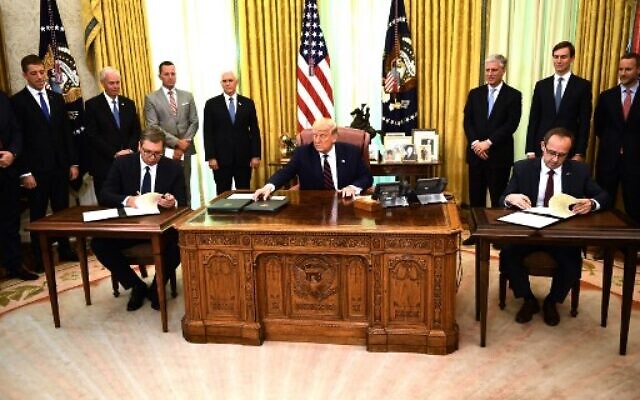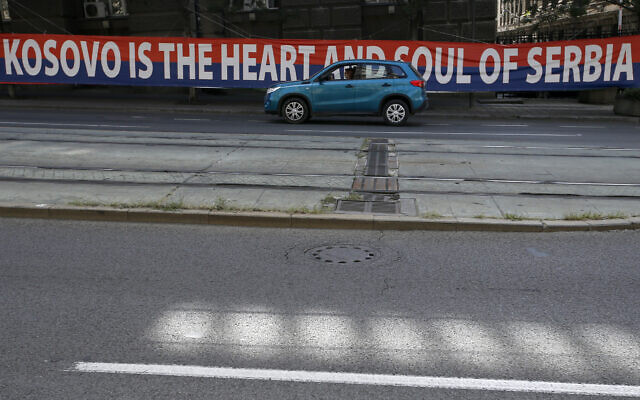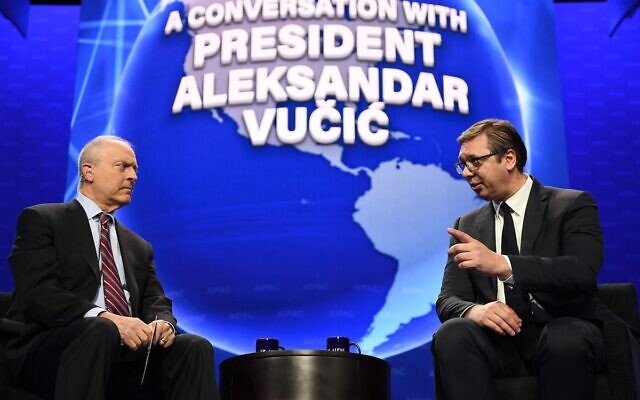Pristina’s move to recognize the Jewish state is being hailed as a breakthrough, but it had long been courting Jerusalem, which balked at endorsing a unilateral statehood move

On Friday, Serbia and Kosovo vowed to open embassies in Jerusalem. If these neighboring southeastern European countries follow through on their promises, the number of nations that have embassies in Israel’s capital will double — from two to four.
The announcements by Belgrade and Pristina, made in Washington after what appears to be intense pressure from the US administration, are another diplomatic achievement for Prime Minister Benjamin Netanyahu, though one that’s less dramatic than might be thought.
“I welcome the agreement with Kosovo, which will be the first Muslim country to open an embassy in Jerusalem. Serbia will be the first European country to open an embassy in Jerusalem,” Netanyahu said on Saturday evening.
These facts are correct — and indeed noteworthy — but others rather overstated the magnitude of the accomplishment.
“Another breakthrough, another Muslim country normalizing ties with Israel,” Israel’s ambassador to the United Nations, Gilad Erdan, said in a statement. “After the UAE and Kosovo, I believe more Muslim and Arab states will opt for peace, leaving the Palestinians isolated. Perhaps this will convince future Palestinian leaders to make concessions for peace.”
US National Security Advisor Robert O’Brien hailed the Kosovo announcement as a “signal accomplishment” for President Donald Trump.
“This is now the second time in less than a month that Israel has made peace with and has normalized its ties with a majority-Muslim country,” he gushed.

Palestinian implications
It’s true that the Palestinians are unhappy about Belgrade and Pristina, but the juxtaposition of Kosovo and the United Arab Emirates is misleading. As opposed to the Arab Gulf state — which until very recently had nothing good to say about Israel — the Republic of Kosovo has been publicly courting Israel since before its declaration of independence from Serbia in 2008.
Pristina hasn’t recognized Israel so far not because its Muslim majority was opposed to it, but because Israel hasn’t recognized Kosovo yet, either. Ironically, indeed, Israel refused to recognize Kosovo because it did not want to support a unilateral declaration of statehood, which Jerusalem feared could create a dangerous precedent followed by the Palestinians.
“Israel did not want to endorse a move of separatism by an ethnic minority,” Yigal Palmor, who served as spokesperson of Israel’s Foreign Ministry at the time of Kosovo’s independence, recalled on Saturday.

In fact, the Palestinians took note of Kosovo’s move at the time, and pledged to reproduce it.
“Since February 2008, when the Albanian Muslim majority government in Kosovo unilaterally declared independence and secession from Christian Serbia, winning US and European support, the Palestinian leadership has publicly invoked Kosovo as a model for a prospective Palestinian state,” senior research fellow Dan Diker wrote in a 2010 paper for the Jerusalem Center for Public Affairs.
“Our people have the right to proclaim independence even before Kosovo,” a senior Palestinian Authority official declared in 2008. “And we ask for the backing of the United States and the European Union for our independence.”
Israel is not unique in its position vis-a-vis Kosovo. Five European states have not recognized it out of similar concerns: Spain (fearing Catalan and Basque separatism), Romania and Slovakia (which have Hungarian minorities and worry about irredentism), and Greece and Cyprus (mainly out of Christian-Orthodox solidarity with Serbia).
For a long time, Israel tried to stay out of the Balkan crises, though it has always been seen as more supportive of Serbia. In 2012, after Belgrade voted in favor of Palestinian statehood status at the UN General Assembly, Pristina was hoping Jerusalem would retaliate by recognizing Kosovo. It didn’t happen.
Unfortunately, not many Kosovars have had the opportunity to visit Israel, but our people look up to Israel as an example of how a state can be built
Still, the Kosovars remained well-disposed toward the Jewish state, occasionally sending senior officials to Jerusalem to advocate for closer ties.
“I was mesmerized with the potential of this country,” Vlora Çitaku, Kosovo’s ambassador to the US, said last year during a visit to Israel. “Unfortunately, not many Kosovars have had the opportunity to visit Israel, but our people look up to Israel as an example of how a state can be built.”
In fact, the country’s president, Hashim Thaci, has long been a fan of the Jewish state. “I love Israel. What a great country. Kosovo is a friend of Israel,” he said in 2007 interview. “I met so many great leaders when I was there — Netanyahu, [former prime minister Ariel] Sharon — I really admire them.”
Israel didn’t return the love. “We are monitoring the situation between Serbia and Kosovo, and we really hope that in the future, in the next few years, you will achieve a really comprehensive and peaceful solution,” then-foreign minister Avigdor Liberman said in Belgrade two years later, in response to a question about possibly recognizing Kosovo.
Even the idea of trading recognition for a Jerusalem embassy is not new. “If Kosovo were recognized by Israel, I would place the Kosovo embassy in Jerusalem,” Thaci promised back in September 2018.
So, why did the deal come to fruition now?
This may have to do with pressure by the US administration, which is trying hard to score additional foreign policy points before the presidential election in November. After all, Trump loves to highlight his 2017 recognition of Jerusalem as Israel’s capital, and his relocation of the US Embassy to Tel Aviv in 2018, especially in front of Evangelical audiences. And how could Netanyahu say no when Trump asked him to recognize Kosovo in return for another embassy in the city?
I welcome the announcement of Israeli PM @netanyahu about the genuine intention to recognize #Kosovo and establish diplomatic relations. Kosovo will keep its promise to place its diplomatic mission in #Jerusalem 🇽🇰🇮🇱🇺🇸
— Hashim Thaçi (@HashimThaciRKS) September 4, 2020
The Serbian mystery
Serbia’s commitment to open an embassy came as a bit of a surprise, especially since President Aleksandar Vučić had indicated just a few months ago that while he intends to open an “official state office” in Jerusalem, the country’s embassy would remain in Tel Aviv.
“We are in a very complex situation in our region. And you should understand all the difficulties we are facing. But I want to say that we’re trying to find the best possible way to do something officially in Jerusalem,” Vučić told the AIPAC Policy Conference in Washington, DC, on March 4.
“And we are going to open very soon not only an office of our Chamber of Commerce,” he added, “but, together with our Chamber of Commerce, the official state office in Jerusalem with Serbian official flag alongside with our embassy in Tel Aviv.”

The reasons for Vučić’s unexpected about-face are currently unclear. It may have to do with pressure from the US, combined with the desire not to be outshone by Kosovo, as the two countries — which don’t currently recognize each other — signed an economic normalization agreement brokered by Washington.
On Friday, Vučić appeared to react with puzzlement to Trump’s Oval Office announcement about Belgrade’s commitment to open an embassy in Jerusalem by July 2021, which led some on Twitter to speculate that the Serbian leader did not know what he had just signed on to. But he has since indicated that he indeed plans to move his country’s embassy to the Holy City.
Footage that certainly makes it appear that Vucic did not realize he had agreed to moving the Serbian embassy to Jerusalem — or at least not by July, Trump states. Comedy of errors. pic.twitter.com/0QlzmYM3GY
— Jasmin Mujanović (@JasminMuj) September 5, 2020
As reported by The Times of Israel
